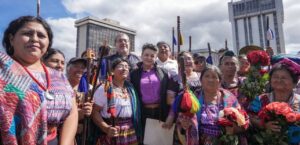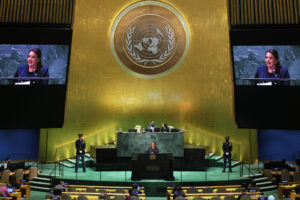A follow up to WOLA's last brief on the first round of the Guatemalan elections. Associate Maureen Meyer continues her analysis of the progress and pending issues in Guatemala's electoral process.
The Second Round:
A WOLA Memo on Progress and Pending Issues
for the Guatemalan Elections
By Maureen Meyer, Associate for Mexico and Central America
Washington Office on Latin America
November 1, 2007
This coming Sunday, November 4th, Guatemalans will return to the polls for a second round of elections and cast their vote for one of two final candidates for the nation’s presidency. Prior to the first-round of voting held September 9th, the Washington Office on Latin America (WOLA) issued “Elections in Guatemala: A WOLA Memo on the Upcoming Presidential Vote,” which outlined our concerns with the process and the challenges faced by Guatemalan authorities to ensure the adequate management of the elections. On the eve of this second vote, WOLA recognizes Guatemala’s accomplishments in its electoral process, including the decentralization of voting stations to facilitate voter participation, particularly in the rural areas, and greater transparency in campaign financing However, concerns remain regarding the high levels of political violence that have marked this election process and the alleged involvement of organized criminal groups in Guatemala’s political process.
Where things stand
Currently the two contenders for the presidency – Álvaro Colom from the National Unity of Hope (Unidad Nacional de la Esperanza, UNE) and Otto Perez Molina of the Patriot Party (Partido Patriota, PP) are neck in neck. While Álvaro Colom lead the first round of the elections with 28% of the vote, as compared to 23.5% for Otto Perez Molina, recent election polls indicate a technical draw between the candidates. If the votes are close, many challenges to the results may be lodged; this only heightens the importance of the fiscales (party observers), as well as national and international observers in scrutinizing the election process. Special attention will also need to be paid to the Supreme Electoral Tribunal’s (Tribunal Electoral Supremo, TSE) resolution of potential challenges to the election results.
In the months following the first round of the elections, confrontations and allegations between the two candidates increased, while real debate about each parties’ proposals has been sorely lacking. The Myrna Mack Foundation further notes that both parties “have avoided directly discussing the issue of the criminal structures that surround them,” making it difficult to discern whether the candidates and their key team members will implement actions and efforts directed at combating the influence of organized criminal groups. 1
Decentralization and participation
The decentralization of Guatemala’s voting stations (more than doubling their number throughout the country, particularly in the rural areas), has been lauded by national and international bodies as a significant step in increasing participation in the country’s electoral process. According to the TSE, 70% of rural voters participated in the September 2007 elections, compared to 57% of their urban counterparts. In addition, the electoral coalition Mirador Electoral2 reported that voter participation in 77 of the 94 municipalities with the largest indigenous populations was higher than the national average.3
While decentralization has been successful, challenges still remain to update Guatemala’s voter registry, which currently contains accurate information for less than 60% of all registered voters. It is critical to address this in order to ensure that voters are able to cast their ballots in the voting stations established under decentralization, as opposed to traveling to the municipal seat. Updating the voter registry would also attend to the problem of duplicate cédulas (ID documents used for voting) which occurred in certain cases during the September elections.
Campaign financing and transparency
The regulations for control and oversight of private and public campaign financing enacted in January by the TSE, and the 2004 reforms to the Law for Elections and Political Parties, marked the creation of a series of controls and reporting mechanisms that are an important step towards increased transparency and the strengthening of democracy. However, a large gap remains between the established norms and what is actually practiced by the political parties. Two of the 16 parties that participated in the 2007 elections process- the Guatemalan Republican Front (Frente Republicano Guatemalteco, FGR) and Democratic Union (Unión Democrático, UD) – never presented a campaign budget to the TSE. Additionally, several parties have only partially provided campaign finance information to the TSE. Mirador Electoral’s monitoring of party spending on publicity reports that half of the 14 parties who presented campaign budgets went over their own budget allocations for media spending. In the case of the PP and UNE, both parties went over the TSE’s 42 million quetzal limit for campaign spending on publicity expenses alone, not including what they spent on logistics, personnel and other costs. The TSE’s lack of power to investigate campaign financing and the insignificant sanctions for non-compliance – a fine of 100 to 1,000 quetzals (up to $140 USD) – are also concerning.
Political violence and conflict
The 2007 election campaign is considered by many analysts to be the most violent since the country’s return to democracy in 1985. It has been reported that at least 54 people linked to politics were murdered between March and October 2007, and 89 violent acts were perpetrated against such individuals. In events closer to the candidates themselves, Perez Molina’s assistant, Aura Salazar, and Valerio Castañón, who served as Perez Molina’s body guard when he was a presidential envoy, were murdered while traveling together on October 8, 2007. Days before, Cornel Giovanni Pacay, who worked together with Perez Molina as part of the Estado Mayor Presidencial and with whom it is believed Perez Molina maintained close ties, was also murdered. With a little more than three weeks left before the second round of elections, the UNE’s strategist, José Carlos Marroquín, also resigned from his post because of threats that he had received from groups linked to organized crime. Due to the high levels of general violence in the country, it is difficult to determine if these cases of violence are directly related to politics. However, the impunity that prevails in investigating acts such as murders in Guatemala does not present an encouraging scenario for ensuring the adequate investigation and sanctioning of those responsible for said crimes.
The election-day violence and conflict that marked the first round of elections is expected to be less prevalent during this second round as many of the conflicts concern local elections. Mirador Electoral reported that they had registered 55 electoral conflicts in the month of September. These conflicts occurred in 41 Guatemalan municipalities and were mainly due to the reelection of incumbent mayors, disagreement with the results or allegations of electoral fraud, fake or altered voter identification cards, and actions against the freedom to vote.4 The TSE recognized that there were serious violations of the voting process in 15 municipalities. In two municipalities, Tucurú, Alta Verap
az and San Marcos La Laguna, Sololá, the election results were annulled because of conflicts that led to the burning of at least a third of the ballots. Voting for these municipal representatives will take place on November 4th.
The TSE has reported that there are 19,500 members of the National Civil Police and 16 thousand soldiers from the army available for security during the elections and that special emphasis will be placed on 16 municipalities with a history of electoral conflicts.
Election Observation
As with the September 2007 general elections, there will be a large presence of national and international election observers. This will include observers from Mirador Electoral, the Indigenous Mission of Election Observation and other national groups as well as Election Observation Missions from the European Union and the Organization of American States (OAS).
Recommendations
In light of the second round of elections in Guatemala, WOLA reiterates the recommendations issued prior to the federal elections held on September 9, 2007:
· WOLA believes that the TSE and Guatemalan government should ensure that adequate security is in place for election day and during the vote-tallying to prevent any disruption of the process.
· The Guatemalan government should carry out prompt, thorough and impartial investigations into the murders and attacks against party members that have occurred in the months prior to the election.
· While new campaign financing regulations promote transparency and accountability, the TSE’s ability to sanction non-complying parties should be enhanced. Campaign financing should be monitored more effectively to make it harder for organized crime and drug traffickers to make substantial contributions to political candidates.
· Given security concerns as well as the possibly close presidential elections, which may lead to many challenges of the results, WOLA believes that national and international observers will need to devote considerable resources to the election. Such observation will be essential to guaranteeing free, fair and transparent elections.
1 Fundación Myrna Mack, “Breves reflexiones en torno a la segunda vuelta electoral, los candidates y los desafíos pendientes de la sociedad,” October 19, 2007.
2 The members of Mirador Electoral are: FLACSO Guatemala, Instituto Centroamericano de Estudios Políticos (INCEP), Asociación Desarrollo, Organización, Servicios y Estudios socioculturales (DOSES), Acción Ciudadana and Centro de Estudios de la Cultura Maya (CECMA).
3 Mirador Electoral, “La participación indígena en el proceso electoral Guatemala 2007: una tarea inconclusa,” Sixth Report, October 12, 2007.
4 Mirador Electoral, “Conflictos municipales y justicia electoral,” Eighth Report, October 24, 2007.


